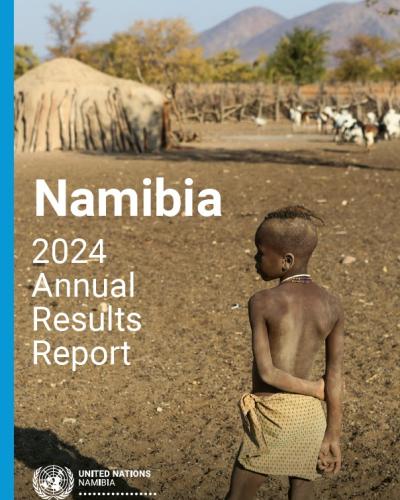2024 Annual Results Report

Advancing Namibia’s Sustainable Development Journey: 2019–2024
The United Nations Partnership Framework (UNPAF) 2019–2024 marked a transformative chapter in Namibia’s development journey. Through strong collaboration with the Government of Namibia, development partners, civil society, and the private sector, the UN system supported the country’s Vision 2030 and its commitment to the Sustainable Development Goals (SDGs).
Guided by four strategic pillars—Economic Progression, Social Transformation, Environmental Sustainability, and Good Governance—the UN’s work has contributed to tangible development outcomes across key sectors.
Economic Progression
The UN supported Namibia’s efforts to boost employment, industrialization, and inclusive growth. Initiatives like the Empretec Namibia Programme empowered youth and women entrepreneurs with skills and access to finance. Support to trade expansion through the AfCFTA and the promotion of Namibia’s Green Hydrogen Initiative helped position the country as a leader in the green economy. Interventions in agriculture and food systems, including climate-smart farming and hydroponics, strengthened rural livelihoods and food security.
Social Transformation
UN interventions improved access to quality health and education, while reinforcing gender equality and social protection systems. Milestones include a reduction in new HIV infections, expansion of Universal Health Coverage, and the rollout of digital learning innovations through the Transforming Education Summit. The strengthening of the Integrated Social Protection System enhanced the government’s ability to support the most vulnerable, while efforts to combat gender-based violence and promote women’s leadership showed meaningful progress.
Environmental Sustainability
Namibia demonstrated strong leadership in addressing climate change and promoting sustainable development. The revision of its Nationally Determined Contributions (NDCs) and the development of the Monitoring, Reporting, and Verification (MRV) Portal were major steps forward. The UN also supported ecosystem restoration, renewable energy solutions, and sustainable fisheries management, reinforcing Namibia’s commitment to preserving its natural resources.
Good Governance
Through institutional strengthening and civic engagement, the UN contributed to more accountable and responsive governance. Support included electoral assistance, capacity development for public institutions, and improved access to justice via the Legal Aid and Access to Justice Programme. The National Human Rights Tracking System enabled transparent monitoring of international commitments, while efforts to enhance gender representation in leadership and national data systems strengthened the foundations for inclusive governance.
Looking Ahead: UNSDCF 2025–2029
Building on these achievements, the United Nations Sustainable Development Cooperation Framework (UNSDCF) 2025–2029 has been developed to align with Namibia’s Sixth National Development Plan (NDP6), Vision 2030, and the SDGs. This new framework emphasizes innovation, partnership, and inclusive growth, ensuring that all Namibians benefit from development gains.
Together, we look forward to a future of shared progress—leaving no one behind.





















